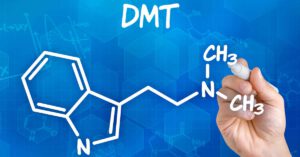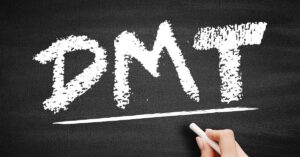DMT is a psychedelic compound found in various plant species. The compound, also known as the “spirit molecule,” produces powerful hallucinations and mystical experiences when ingested. Even though DMT has been used in traditional South American ceremonies for centuries, many people wonder if the chemical is addictive.
 DMT (Dimethyltryptamine) is a hallucinogenic drug that naturally occurs in many plants and animals. Although DMT is lesser known than other psychedelics such as LSD, the structure of the chemical compound is similar to psilocybin (magic mushrooms). As a result, DMT produces a brief but intense visual and auditory hallucinogenic experience.
DMT (Dimethyltryptamine) is a hallucinogenic drug that naturally occurs in many plants and animals. Although DMT is lesser known than other psychedelics such as LSD, the structure of the chemical compound is similar to psilocybin (magic mushrooms). As a result, DMT produces a brief but intense visual and auditory hallucinogenic experience.
Although DMT has a rich history in South American countries, the chemical compound is a Schedule I controlled substance in the United States. It is illegal to manufacture, buy, possess, and distribute DMT in the United States. This categorization also means that DMT has a high potential for abuse.
Even though DMT is illegal, some people believe ingesting the chemical will help them experience an “awakening” or deep spiritual insight. Most people drink naturally occurring DMT as part of an ayahuasca brew. Synthetically produced DMT, which looks like a white crystalline powder, is often smoked in a pipe, snorted, or injected into users’ veins.
Although DMT is mainly known as “the spirit molecule,” the chemical can also be called “Dimitri,” “Changa,” and “Fantasia.”
One of the most known effects of DMT is a very intense “trip” that distorts colors, sounds, and objects. Even time can seem strange when people are under the influence of DMT. Some people taking DMT have out-of-body experiences.
Other effects of DMT include:
Often, people under the influence of DMT behave and react unpredictably. Some people feel like they can’t move, while others report feeling like they’re going through a near-death experience.
Even though debates about DMT are ongoing, there are some physical and psychological risks associated with the substance.
Some of the physical health risks associated with DMT include:
High doses of DMT can lead to:
Some of the emotional and psychological risks of DMT include:
Using DMT can also lead to serotonin syndrome. This condition occurs when the body accumulates an excessive amount of serotonin. The syndrome, which is often caused by taking a combination of different drugs simultaneously, can cause:
Unlike most hallucinogens, there is not much evidence that suggests DMT causes tolerance, dependence, or physical withdrawal symptoms. However, DMT can be psychologically addictive. As a result, many people who use DMT develop a strong desire to keep taking the substance to experience its powerful effects. Some people even use DMT as therapy and consume the substance regularly to feel better. People may feel like they can not stop taking DMT when this happens.
Some studies also suggest that people can develop cravings for DMT. At this point, people may experience psychological distress when they are not using DMT. Behaviors that show this level of dependence include taking higher doses of DMT, consuming the substance more frequently, and spending large amounts of money on DMT.
Even though recreational abuse of DMT is not common, it does happen. People who regularly use DMT can become more susceptible to addiction to other psychedelic drugs like psilocybin and LSD.
DMT is not physically addictive, but that doesn't mean it's safe. Using the drug can trigger pre-existing conditions like anxiety or depression in users who are already susceptible to these illnesses and even lead them into self-harm behavior known as a “bad trip.”
DMT is not considered an addictive drug, but people who use the substance may develop tolerance and psychological addiction. When that happens, people might show signs of dependence that include:
Even though DMT use rarely leads to physical addiction, people who develop a psychological dependence on DMT need addiction treatment. There isn’t a one-size-fits-all treatment for DMT addiction, but several practical approaches can be tailored to the individual. These approaches often include behavioral therapy, individual and group counseling, and support groups. Medications can help manage withdrawal symptoms and cravings.
DMT addiction can lead to some severe problems, but many people can lead healthy, productive lives with treatment.
At Meta, we offer outpatient treatment programs, cognitive-behavioral therapy, dialectical behavioral therapy, case management, and peer support.
DMT is a powerful psychedelic compound. Even though DMT has been used for centuries in traditional South American ceremonies, there are risks associated with its use. Using the substance can also lead to dependence and psychological addiction. Luckily, our flexible treatment programs help individuals overcome psychological and physical addiction. Contact us today to learn more.